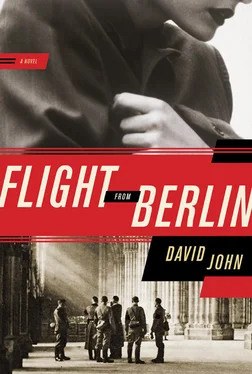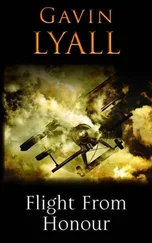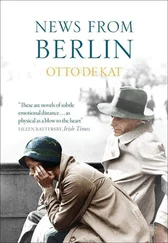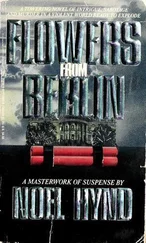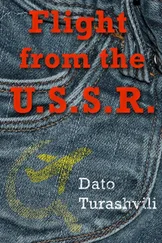David John - Flight from Berlin
Здесь есть возможность читать онлайн «David John - Flight from Berlin» весь текст электронной книги совершенно бесплатно (целиком полную версию без сокращений). В некоторых случаях можно слушать аудио, скачать через торрент в формате fb2 и присутствует краткое содержание. Жанр: Шпионский детектив, на английском языке. Описание произведения, (предисловие) а так же отзывы посетителей доступны на портале библиотеки ЛибКат.
- Название:Flight from Berlin
- Автор:
- Жанр:
- Год:неизвестен
- ISBN:нет данных
- Рейтинг книги:4 / 5. Голосов: 1
-
Избранное:Добавить в избранное
- Отзывы:
-
Ваша оценка:
- 80
- 1
- 2
- 3
- 4
- 5
Flight from Berlin: краткое содержание, описание и аннотация
Предлагаем к чтению аннотацию, описание, краткое содержание или предисловие (зависит от того, что написал сам автор книги «Flight from Berlin»). Если вы не нашли необходимую информацию о книге — напишите в комментариях, мы постараемся отыскать её.
Flight from Berlin — читать онлайн бесплатно полную книгу (весь текст) целиком
Ниже представлен текст книги, разбитый по страницам. Система сохранения места последней прочитанной страницы, позволяет с удобством читать онлайн бесплатно книгу «Flight from Berlin», без необходимости каждый раз заново искать на чём Вы остановились. Поставьте закладку, и сможете в любой момент перейти на страницу, на которой закончили чтение.
Интервал:
Закладка:
He waved his hand, not interested in an answer, and sat down again to a fugue of leathery creaks and squeaks.
‘I’m a British subject, Inspector, and can’t be held-’
‘Your passport won’t save you from an espionage charge.’ He gave a quiet, hissing laugh. ‘Annoying as this is, the SD have done me a favour here. With an espionage charge we keep you as long as we like. But the SD want you unspoilt ’-his eyebrows rose at this veiled slur on his professionalism-‘and that order comes from the top. So I’m curious, Herr Denham. What is this really about? Mm?’
Denham had absolutely no idea. The SD, the Sicherheitsdienst, was the state’s intelligence service, a cadre within the SS. That’s about all he knew. It was known to be a cut above the sadists in the Gestapo, attracting educated recruits.
‘You seem to know more than I do, Inspector.’
Haeckel picked up a rubber stamp and began twirling it between his fingers, still observing Denham, eyes narrowed like gun slits.
‘The SD don’t bother with lists of stocking-fillers like these. That is the type of donkey-work they leave to me. As for the espionage, an explosive bag of gas like the Hindenburg has the technological value of my mother-in-law’s arse. So they’re keeping me in the dark about something. What makes you special, eh?’
Denham gave a shrug, and Haeckel suddenly hurled the stamp towards his head. He flinched, and it struck the door with a clack.
‘A British agent, are we?’ he barked. ‘Or spying for the NKVD?’
Denham’s brain was spinning, and his face must have shown it. ‘I’m just a reporter.’
‘All right, all right,’ Haeckel said, stroking his moustache and seeming to have remembered in time his orders not to harm the prisoner. His face was crimson. ‘It will all come out in the end… makes no difference to me.’ He picked up the telephone and summoned the sergeant. Then he said, ‘When the SD are done with you, sir, you and I will go over every single thing said between you and that Liebermann woman. For as long as it takes…’
E leanor rang the bell next to the ornate door of Kopischstrasse 5 and put her face to the glass. A small woman with trailing wisps of hair and a long shawl clutched to her chest shuffled out from a ground-floor apartment and opened it for her.
‘Uh, Richard Denham? Is he here?’ she said, hoping to aid communication with smiles and hand gestures.
At the mention of Denham’s name, fear animated the old woman’s face. She shook her head, dissembling away in German to Eleanor’s bewilderment, and retreated quickly back to her apartment. Her door closed, but Eleanor sensed the rheumy blue eyes watching through the pattern in the frosted glass.
The name on the first-floor apartment was Reinacher, from whose door came the sound of a radio playing military band music; she continued to the second floor with a mounting sense that something was wrong. She found Denham’s door and knocked. It swung inwards with a quiet moan on its hinges.
The place had been worked over so thoroughly it looked like a grenade had exploded, and two cigarette butts had been stubbed into the rug, leaving burn marks. She tiptoed into the mess of smashed record discs, overturned drawers, and opened books. On the floor a yellow telegram slip caught her eye. So his son had not been found. What was going on? She stood still for a moment, mystified, and a flat voice startled her.
‘Kann ich Ihnen helfen?’
A tall, fat-headed man was standing in the doorway, holding a collection tin with a swastika on it.
He gestured to the mess in the room, speaking in a droning voice. Only the word Gestapo was clear to her among the alien words and made itself understood.
H is rumbling stomach told him roughly what the hour was, but he knew he’d soon lose track of time. An electric light hummed behind a wire grill. He didn’t imagine they ever turned it off. In the next-door cell a man moaned.
Every thought that came to him swirled around and slipped away. The fears of never seeing Tom again mixed with his dread of what the SD had in store. He drew his feet up and buried his nose between his knees, struggling to imagine why he could possibly be here.
The espionage charge was a trumped-up ploy to stop the embassy from getting him released in a hurry. He was fairly sure of that. The other charges were trivial except for one-speaking to Hannah-which the inspector seemed to think was a Gestapo matter. But who knows what turf wars were fought in the dark labyrinths of the Nazi state. Maybe the matter was too serious for Haeckel.
But why had they been watching him before he’d even made contact with Hannah? They knew about his trip on the Hindenburg; they knew he was at the reception on the Pfaueninsel, and of his night at the Nollendorfplatz Theatre.
What did they want?
Hours passed, and he fell into a nervous stupor, too edgy to sleep, too drained to move. When footsteps echoed in the corridor outside, he jumped. An eye appeared in the peephole, a bolt was drawn back, and the door opened. A man in a dark suit stepped into the cell.
‘Herr Denham?’ he said with an interested smile. ‘I am Hauptsturmfuhrer Udo Rausch. I’ve been looking forward to meeting you.’
Chapter Nineteen
Two guards with the SD flash on their sleeves led Denham from the cell. The man in the suit, Hauptsturmfuhrer Rausch, was perhaps a year or two younger than Denham, and looked as though he’d dined well somewhere. He greeted the sergeant and asked after his wife, joked with the orderlies smoking in the darkening courtyard, and walked with his hand on Denham’s shoulder, almost friendly, as though they were professors between lectures. A new BMW, its engine idling, was waiting. Before they got in, Rausch lit a Murad and offered one to Denham.
‘No, thanks. Turkish isn’t my brand.’
‘They’re not to everyone’s taste,’ he agreed. ‘I picked up the habit in Ankara. Served there with the German Foreign Ministry for two years.’
That solves one puzzle, Denham thought. The hempy aroma filling the car was the same he’d smelt in his apartment.
A minute’s drive and the car turned into a garden courtyard off the Wilhelmstrasse, stopping outside the covered portico of an elegant classical building. Inside was a marble hallway of columns and red drapes. The uniformed woman on the front desk, blond hair plaited into pretzels, beamed at Rausch; young men in suits passed on their way out, bidding him a good evening. Denham followed him up a marble staircase overhung by an enormous chandelier, making slow progress without shoelaces. The guards were two steps behind.
‘This was a summer palace of the Hohenzollerns,’ Rausch said over his shoulder. ‘Designed by Schinkel. A refinement that’s rather lost on our Gestapo cousins.’
They passed down a long carpeted corridor, and climbed another flight to a narrow service corridor in what seemed like an old servants’ quarter. At the far end Denham was shown into a room with bright overhead lights and a small barred window, and was asked to sit on a chair in the centre of the room. The only other furnishings were a table with a telephone on it, a row of wooden chairs, and a portrait photograph of Reinhard Heydrich, head of the SD, peering from the wall.
Heydrich, the Blond Beast. The man’s Nordic nose was so long it almost put the rest of his face out of focus, but the tiny, deep-set eyes were as bright as pins. Heydrich the Pitiless. Heydrich the Hangman. Thirty-two years old and one of the most powerful men in Europe.
Denham’s suspicion that his captor’s genial manner was part of some technique was borne out immediately.
‘I’ve always felt that interrogation is more art than science where an intelligent detainee is concerned,’ Rausch began, taking a seat. ‘Especially one who’s a war veteran. In such cases incentive can be fruitful where intimidation is not. Perhaps not something a brute like Haeckel would understand, although I daresay he gets to the bottom of everything in his inimitable way. Chips fly when you have to chop wood.’ The German gave a small, satisfied laugh.
Читать дальшеИнтервал:
Закладка:
Похожие книги на «Flight from Berlin»
Представляем Вашему вниманию похожие книги на «Flight from Berlin» списком для выбора. Мы отобрали схожую по названию и смыслу литературу в надежде предоставить читателям больше вариантов отыскать новые, интересные, ещё непрочитанные произведения.
Обсуждение, отзывы о книге «Flight from Berlin» и просто собственные мнения читателей. Оставьте ваши комментарии, напишите, что Вы думаете о произведении, его смысле или главных героях. Укажите что конкретно понравилось, а что нет, и почему Вы так считаете.
